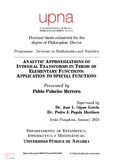Mostrar el registro sencillo del ítem
Analytic approximations of integral transforms in terms of elementary functions: application to special functions
| dc.contributor.advisor | López García, José Luis | es_ES |
| dc.contributor.advisor | Pagola Martínez, Pedro Jesús | es_ES |
| dc.creator | Palacios Herrero, Pablo | es_ES |
| dc.date.accessioned | 2023-02-24T09:38:59Z | |
| dc.date.available | 2023-02-24T09:38:59Z | |
| dc.date.issued | 2023 | |
| dc.date.submitted | 2023-02-21 | |
| dc.identifier.uri | https://hdl.handle.net/2454/44804 | |
| dc.description.abstract | This thesis focuses on the study of new analytical methods for the approximation of integral transforms and, in particular, of special functions that admit an integral representation. The importance of these functions lies in the fact that they are solutions to a great variety of functional equations that model specific physical phenomena. Moreover, they play an important role in pure and applied mathematics, as well as in other branches of science such as chemistry, statistics or economics. Usually, the integrals defining these special functions depend on various parameters that have a specific physical meaning. For this reason, it is important to have analytical techniques that allow their computation in a quick and easy manner. The most commonly used analytical methods are based on series expansions of local validity: Taylor series and asymptotic (divergent) expansions that are, respectively, valid for small or large values of the physically relevant variable. However, neither of them is, in general, simultaneously valid for large and small values of the variable. In this thesis we seek new methods for the computation of analytic expansions of integral transforms satisfying the following three properties: (a) The expansions are uniformly valid in a large region of the complex plane. Ideally, these regions should be unbounded and contain the point 0 in their interior. (b) The expansions are convergent. Therefore, it is not necessary to obtain error bounds or to study the optimal term to truncate the expansion: the more terms considered, the smaller the error committed. (c) The expansions are given in terms of elementary functions. We develop a theory of uniform expansions that shows the necessary and sufficient conditions to obtain expansions of integral transforms fulfilling the three conditions (a),(b) and (c) above. This theory is applied to obtain new series approximations satisfying (a), (b) and (c) of a large number of special functions. The new expansions are compared with other known representations that we may find in the literature to show their ad-vantages and drawbacks. In contrast to the Taylor and asymptotic expansions, the main benefit of the uniform expansions is that they are valid in a large region of the complex plane. For this reason, they may be used to replace the function they approximate (which is often difficult to work with) when it appears in certain calculations, such as a factor of an integral or in a differential equation. Since these developments are also given in terms of elementary functions, such calculations may be carried out easily. Next, we consider a particularly important case: when the kernel of the integral transform is given by an exponential. We develop a new Laplace’s method for integrals that produces asymptotic and convergent expansions, in contrast to the classical Laplace method which produces divergent developments. The expansions obtained with this new method satisfy (a) and (b) but not (c), since the asymptotic sequence is given in terms of incomplete beta functions. Finally, we develop a new uniform asymptotic method 'saddle point near an end point' which does not satisfy (b) and (c) but, unlike the classical 'saddle point near an end point' method, allows us to calculate the coefficients of the expansion by means of a simple and systematic formula. | en |
| dc.description.sponsorship | This work was supported by the Ministerio de Economa y Competitividad (MTM2014-52859-P and MTM2017-83490-P) and Universidad Publica de Navarra PRO-UPNA (6158). | en |
| dc.format.extent | 190 p. | |
| dc.format.mimetype | application/pdf | en |
| dc.language.iso | eng | en |
| dc.rights | © Todos los derechos reservados | es_ES |
| dc.subject | Uniform expansions | en |
| dc.subject | Integral transforms | en |
| dc.subject | Special functions | en |
| dc.title | Analytic approximations of integral transforms in terms of elementary functions: application to special functions | en |
| dc.type | info:eu-repo/semantics/doctoralThesis | en |
| dc.type | Tesis doctoral / Doktoretza tesia | es |
| dc.contributor.department | Estadística, Informática y Matemáticas | es_ES |
| dc.contributor.department | Estatistika, Informatika eta Matematika | eu |
| dc.rights.accessRights | info:eu-repo/semantics/openAccess | en |
| dc.rights.accessRights | Acceso abierto / Sarbide irekia | es |
| dc.identifier.doi | 10.48035/Tesis/2454/44804 | |
| dc.relation.projectID | info:eu-repo/grantAgreement/MINECO//MTM2014-52859-P/ES/ | en |
| dc.relation.projectID | info:eu-repo/grantAgreement/AEI/Plan Estatal de Investigación Científica y Técnica y de Innovación 2013-2016/MTM2017-83490-P/ES/ | en |
| dc.relation.publisherversion | https://doi.org/10.48035/Tesis/2454/44804 | |
| dc.contributor.funder | Universidad Pública de Navarra / Nafarroako Unibertsitate Publikoa | es |
| dc.description.doctorateProgram | Programa de Doctorado en Matemáticas y Estadística (RD 99/2011) | es_ES |
| dc.description.doctorateProgram | Matematikako eta Estatistikako Doktoretza Programa (ED 99/2011) | eu |


